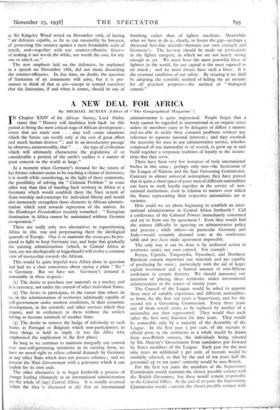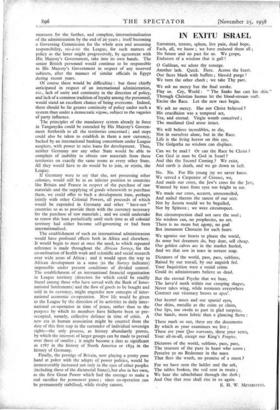A NEW DEAL FOR AFRICA
By MICHAEL HUXLEY (Editor of " The Geographical Magazine ")
IChapter .X.X.IV of his African Survey, Lord Halley 1 states 'that " History will doubtless look back on this period as being the most critical stage of African development ; errors that are made now . . . may well create situations which the future can rectify only at the cost of great effort and much human distress " ; and in an introductory passage he observes; unanswerably, that " . . . the type of civilisation which will 'ultimately characterise the population of so considerable a portion of the earth's surface is a matter of great concern to the world at large."
At a moment when Germany's demand for the return of , her former colonies seems to be reaching a climax of insistence, it is WOrth lvvhile considering, in the light of these comments, the possibility of solving the " Colonial Problem " in some other way than that of handing back territory in Africa to a Germany which would establish there the Nazi system of State-worship and contempt for individual liberty and would also immensely strengthen those elements in African adminis- tration which tend towards repression of the natives. As the Hamburger Fremdenblatt recently remarked : " European domination. in Africa cannot be maintained without German co-operation."
There are really only two alternatives to repartitioning Africa in Allis way and perpetuating there the ideological quarrels of EuroPe. One is to maintain the status quo, be pre- pared to fight to keep Germany out, and hope that gradually the existing administrations (which, in Central Africa at least, are not ideologically at loggerheads) will evolve a common view of trusteeship towards the African.
This would be .quite hopeful were Africa alone in question and had we a .clear conscience about saying a plain " No " to Germany. But we have not. Germany's demand is reasonable in three respects : (1) The desire to purchase raw materials in a market, and in a currency, not under the control of other individual States.
(2) The desire to participate, to the extent that others do so, in the administration of territories admittedly capable of self-government under modern conditions, in their economic development, in the scientific and other services which they require, and in settlement in them without the settlers having to become nationals of another State.
(3) The desire to remove the badge of inferiority to such States as Portugal or Belgium which non-participation in these things is held to imply (it was the Allies who emphasised • the implication in the first place).
So long as we continue to' maintain integrally our control over non-self-governing territories in its existing form, we have no moral right to refuse colonial demands by Germany or any other State which does not possess colonies ; and we present the Nazi Government, with a grievance which it can exploit for its own ends.
The other alternative is to begin forthwith a process of change leading ultimately to an international administration for the whale of (say) Central Africa. It is, usually assumed (when- the Idea'is discussed at all) that an international administration is quite impractical. ' People forget that a body cannot be regarded as international in an organic sense unless its members cease to be delegates of differeLt nations and are able to tackle their common problems without any reference to separate national interests ; and they overlook the necessity for men in any administrative service, whether composed of one nationality or of several, to grow up in and build together a corporate tradition of loyalty to the institu- tions that they serve.
There have been very few instances of truly international bodies in this sense ; perhaps only two—the Secretariat of the League of Nations and the Saar Governing Commission. Contrary to almost universal assumption, they have proved that in quite a short space of years men of different nationalities can learn to work loyally together in the service of non- national institutions, even in relation to matters over which the States representing their respective nationalities are at variance.
How could we set about beginning to establish an inter- national administration in Central Africa forthwith ? Call a conference of the Colonial Powers immediately concerned and try to form one by agreement ? Even they would find the utmost difficulty in agreeing on administrative policy and practice ; while others—in particular Germany and Italy—would certainly demand seats at the conference table and ipso facto make agreement impossible.
The only way it can be done is by unilateral action in territories under our own control. For example : Kenya, Uganda, Tanganyika, Nyasaland, and Northern Rhodesia contain important raw materials and are capable of producing far more ; particularly with the aid of larger capital investment and a limited amount of non-African settlement in certain districts. We should announce our intention of placing these territories under international administration in the course of twenty years.
The Council of the League would be asked to appoint three men of suitable experience and different nationalities to form, for the first ten years a Supervisory, and for the second ten a Governing Commission. Every three years one of them would retire, to be replaced by another of a nationality not then represented. They would thus each (after the first two) function for nine years. They would be removable only by a majority of the Assembly of the League. In the first year 5 per cent. of the recruits to official posts in the territories as a whole would be drawn from non-British sources, the individuals being selected by His Majesty's Government from candidates put forward by States members of the League. Each year for the next nine years an additional 5 per cent. of recruits would be similarly selected, so that by the end of ten years half the personnel up to ten years' seniority would be non-British.
For the first ten years the members of the Supervisory CommissiOn would maintain the closest possible contact with the British Governors, but these would remain responsible to the Colonial Office. At the end of rip years the Supervisory Commission Would maintain the closest possible contact with measures for the further, and complete, internationalisation of the administration by the end of 20 years ; itself becoming a Governing Commission for the whole area and assuming responsibility, vis-à-vis the League, for such matters of policy as the latter might progressively, by agreement with His Majesty's Government, take into its own hands. The senior British personnel would continue to be responsible to His Majesty's Government in respect of any reserved subjects, after the manner of similar officials in Egypt during recent years.
Of course there would be difficulties : but those chiefly anticipated in respect of an international administration, viz., lack of unity and continuity in the direction of policy, and lack of a common tradition of loyalty among the personnel, would stand an excellent chance of being overcome. Indeed, there should be far greater continuity of policy under such a system than under a democratic regime, subject to the vagaries of party influence.
The principles of the mandatory system already in force in Tanganyika could be extended by His Majesty's Govern- ment forthwith to all the territories concerned ; and steps could also be taken to establish in them a new currency, backed by an international banking consortium under League auspices, with power to raise loans for development. Thus, neither Germany nor any other State would be able to complain of inability to obtain raw materials from these territories on exactly the same terms as every other State. All they would have to do would be to join, or rejoin, the League.
If Germany were to say that she, not possessing other colonies, would still be in an inferior position to countries like Britain and France in respect of the purchase of raw materials and the supplying of goods wherewith to purchase them, we could offer to back a development loan, perhaps jointly with other Colonial Powers, all proceeds of which would be expended in Germany and other " have-not " countries so as to provide them with the currency necessary for the purchase of raw materials ; and we could undertake to renew this loan periodically until such time as all colonial territory had either become self-governing or had been internationalised.
The establishment of such an international administration would have profound effects both in Africa and elsewhere. It would begin to meet at once the need, to which repeated reference is made throughout the African Survey, for the co-ordination of health work and scientific and social research over wide areas of Africa ; and it would open the way to African development in a sense (as the Survey indicates) impossible under present conditions of divided control. The establishment of an international financial organisation in League territory (directors for which could be readily found among those who have served with the Bank of Inter- national Settlements) and the flow of goods to be bought and sold in its currency, might engender new concepts of inter- national economic co-operation. New life would be given to the League by the direction of its activities to daily inter- national co-operation in time of peace, rather than to the purpose by which its members have hitherto been so pre- occupied, namely, collective defence in time of crisis. A new era in human association might be counted from the date of this first step in the surrender of individual sovereign rights—the only process, as history abundantly proves, by which the interests of larger groups can be made to prevail over those of smaller ; it might become a date as significant as 1787 in the history of North America or 1834 in the history of Germany.
Finally, the prestige of Britain, now playing a pretty poor hand at poker with the adepts of power politics, would be immeasurably increased not only in the eyes of other peoples (including those of the dictatorial States), but also in her own, as the first Great Power which had the courage to make a real sacrifice for permanent peace ; since co-operation can be permanently stabilised, while rivalry cannot.















































 Previous page
Previous page